Andrew Nugent
Hello! I recently completed my PhD in the MathSys II CDT and have now moved to a postdoc position at UCL. Up to date news on my research and publications can be found at my personal website: https://sites.google.com/view/andrew-nugent/homeLink opens in a new window
My PhD research, supervised by Susana Gomes and Marie-Therese Wolfram, covers topics in opinion dynamics, interacting particle systems, mean-field limits and evolving networks. My current work at UCL is focused on mathematical biology with Karen Page and Laura Andreae.
Research
Opinion Dynamics with Continuous Age StructureLink opens in a new window
A Nugent, S Gomes, MT Wolfram, 2025, European Journal of Applied Mathematics, pp. 1–36. doi:10.1017/S0956792525100260
 We extend a classical model of continuous opinion formation to explicitly include an age-structured population, considering both an SDE model and the corresponding mean field PDE. We rigorously prove the existence of stationary states in the PDE model, but also observe non-uniqueness of stationary states and periodic behaviour, an example of which is shown on the right. This figure shows the population opinion distribution (integrating over age) which has two large clusters that periodically move, merge and reform.
We extend a classical model of continuous opinion formation to explicitly include an age-structured population, considering both an SDE model and the corresponding mean field PDE. We rigorously prove the existence of stationary states in the PDE model, but also observe non-uniqueness of stationary states and periodic behaviour, an example of which is shown on the right. This figure shows the population opinion distribution (integrating over age) which has two large clusters that periodically move, merge and reform.
Steering opinion dynamics through control of social networksLink opens in a new window
A Nugent, S Gomes, MT Wolfram, 2024, Chaos 1 July 2024; 34 (7): 073109.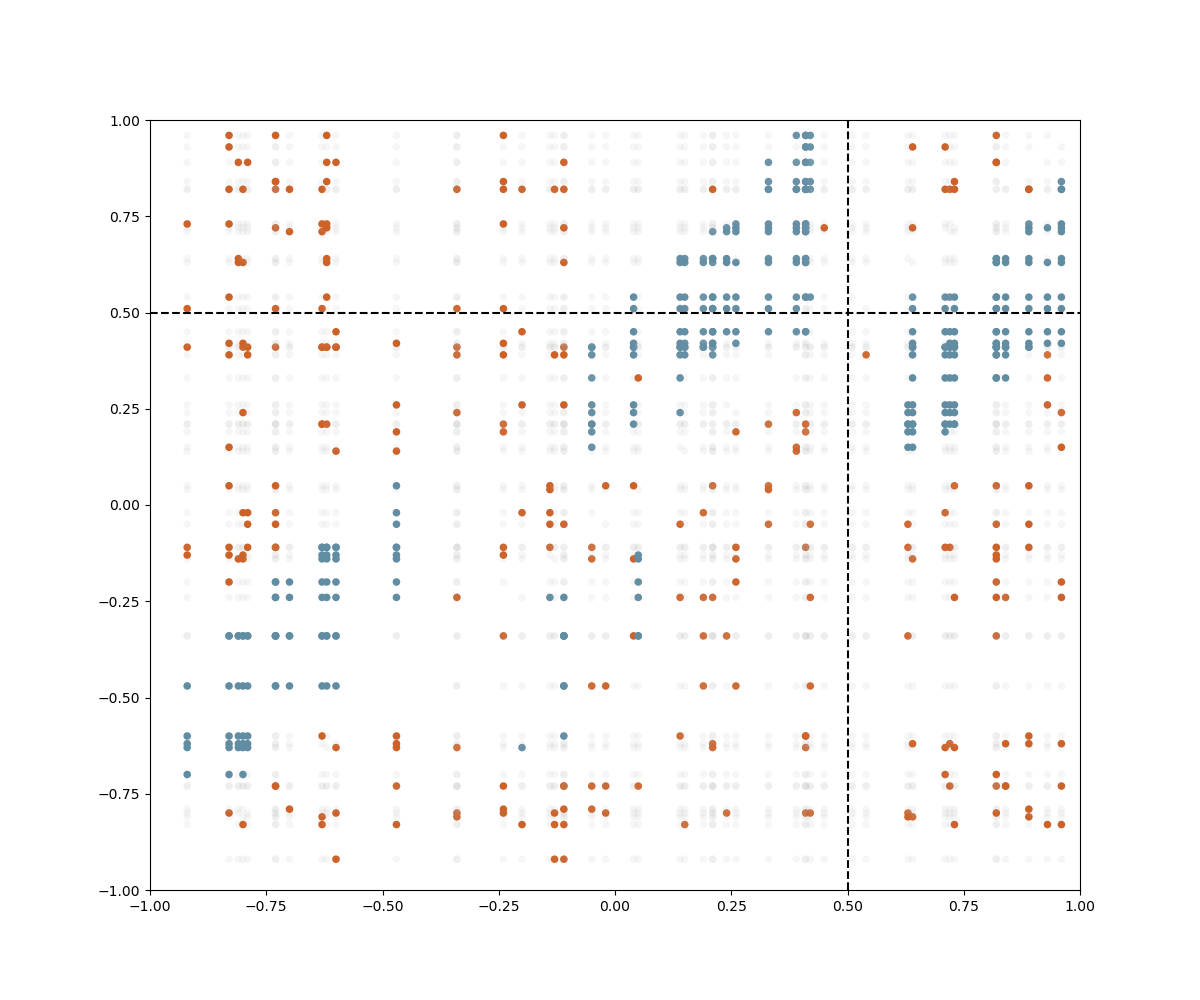
We propose a novel control approach for opinion dynamics on evolving networks. Controls modify the strength of edges rather than influencing opinions directly, with the overall goal of steering the population towards a target opinion. The video shows the evolution in time of an example optimal control solution, with blue and red dots showing where edge weights are being increased and decreased respectively.
In the paper we study controllability, instantaneous control and optimal control. Each approach provides a different view on the complex relationship between opinion and network dynamics and raises interesting questions for future research.
Bridging the gap between agent based models and continuous opinion dynamics.Link opens in a new window
A Nugent, S Gomes, MT Wolfram, 2024, Physica A: Statistical Mechanics and its Applications, 129886.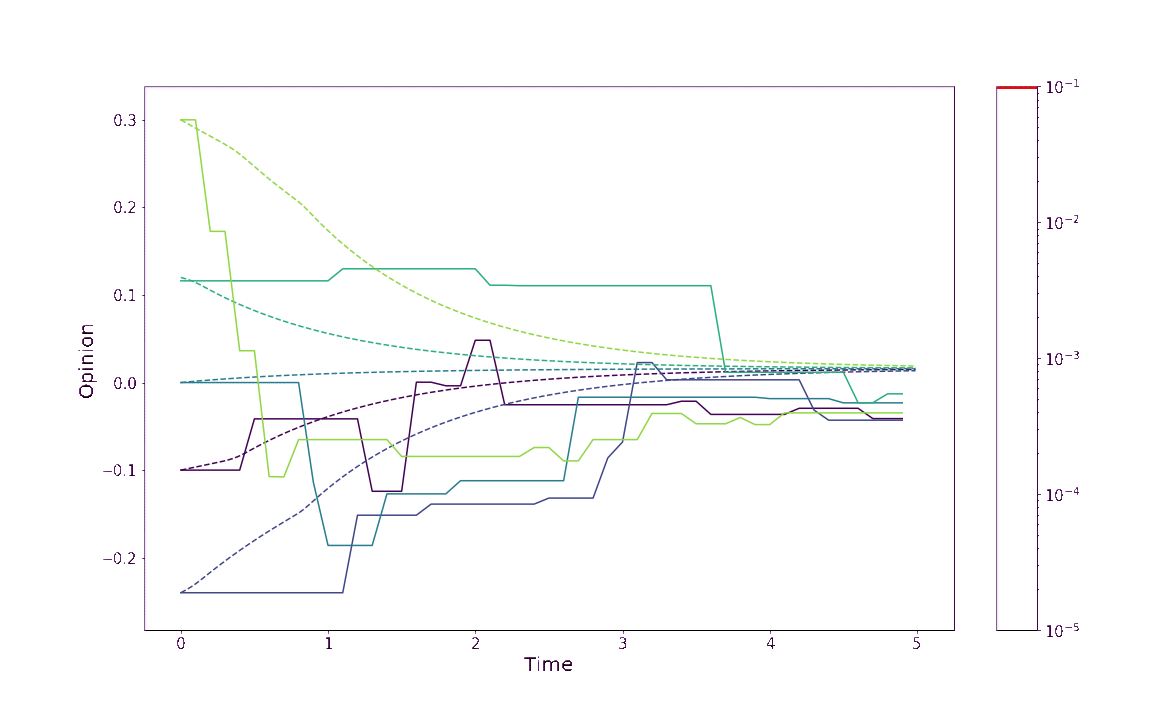
Most microscopic models of opinion dynamics are either agent-based models or differential equation models. We show how the latter can be obtained from the former by simultaneously reducing the time-step and the distance by which agents update their opinions after each random interaction. The video shows realisations of the ABM in solid lines and the limiting ODE in dashed lines.
This connection helps address questions in both settings, for example: the motivation of multiplicative noise terms in SDE models; the link between selection noise and mollification of interaction functions; and how the method for selecting interacting pairs can determine the normalisation in the corresponding ODE/SDE.
On evolving network models and their influence on opinion formation.Link opens in a new window
A Nugent, S Gomes, MT Wolfram, 2023, Physica D: Nonlinear Phenomena 456:133914.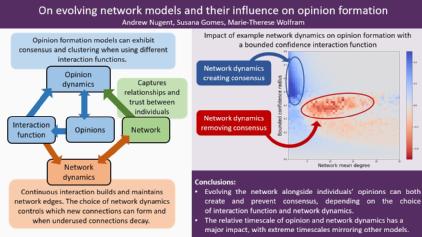
We propose a new model for continuous time opinion dynamics on an evolving network, in which the network evolves through a system of ordinary differential equations for the edge weights. Each edge weight is interpreted as the strength of the relationship between a pair of individuals, with edges increasing in weight if pairs continually listen to each other’s opinions and decreasing if not. The model is examined partly through analytic results and partly through extensive numerical simulations of two case studies: one using bounded confidence interaction dynamics (as in the classical Hegselmann-Krause model) and one using an exponentially decaying interaction function. Particular focus is given to the impact of various edge dynamics on the opinion formation process itself: when does the dynamic network encourage consensus and when does it reinforce polarisation?
Exploring the role of the potential surface in the behaviour of early warning signals.Link opens in a new window
A Nugent, E Southall, L Dyson, 2022, Journal of Theoretical Biology, 554, p.111269.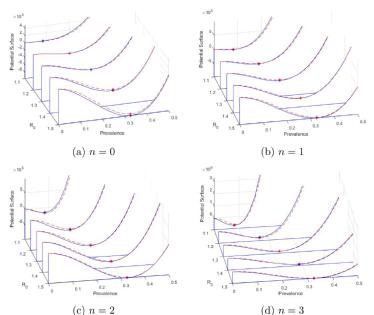
Critical slowing down states that systems display increasing relaxation times prior to a critical transition, an effect that can be observed in timeseries statistics to give an early warning of the transition. However, in epidemiological models there is frequent disagreement with this general theory, moreover the alternative theory of critical speeding up predicts contradictory behaviour of early warning signals. We first describe the behaviour of common early warning signals in terms of a system’s potential surface and noise around a quasi-steady state, then describe an equation-free method to obtain these key features from timeseries, using a version of the SIS model as a case study. The figure shows example reconstructed potential surfaces.
Past Projects
Cyclists' Cardiac Conundrum (MathSys Group Project)
Supervised by: Professor Colm ConnaughtonLink opens in a new window, Ian Green (external partner from CricklesLink opens in a new window)
Collaborators: Jack BuckinghamLink opens in a new window, Yi Ting LooLink opens in a new window
Evidence suggests that those engaging in endurance sports training have an elevated risk of atrial fibrillation, this can be diagnosed accurately using an electrocardiogram (ECG), but this is often unavailable. Our goal in this project was to develop methods for quantifying the degree of the irregularity in readily available heart rate data, and test if this was correlated to self-reported heart rhythm problems.
Exploring approaches to modelling mass vaccination (URSS project)
Supervised by: Dr Louise DysonLink opens in a new window
During the role-out of COVID-19 vaccines, a key question was that of vaccine efficacy. We examined the different ways of incorporating vaccine efficacy into compartmental models, for example: a 90% efficacy could be interpreted as a 90% probability of moving to a fully immune class or a 90% reduction in the rate of infections. These different interpretations give different model structures and different conditions for controllability. In reality, vaccine efficacy has multiple components and should be included in compartmental models in multiple places.
Recorded talks
Below are some recordings of talks given at the SPAAM (Statistics, Probability, Analysis and Applied Maths) seminar at the University of Warwick.
|
|
|
|
|
|
Selected Conferences and Talks
This list is no longer being maintained. For a complete and up-to-date list please see hereLink opens in a new window.
- SIAM Conference on Control and Its ApplicationsLink opens in a new window (CT25) | Montreal, July 25 | Talk on 'Steering Opinion Dynamics Through Control of Social Networks'.
- SIAM Annual MeetingLink opens in a new window (AN25) | Montreal, July 25 | Talk on 'Opinion Dynamics with Continuous Age Structure'.
- BMC-BAMCLink opens in a new window | University of Exeter, June 25 | Organised and chaired the 'Dynamics on Complex Networks' mini-symposium, and gave a talk on 'Steering Opinion Dynamics Through Control of Social Networks' in the mini-symposium for the 2025 IMA Lighthill Thwaites Prize.
- Collective Social Phenomena: Dynamics and DataLink opens in a new window | BIRS Workshop at Casa Matemática Oaxaca, June 25 | Talk on "Connecting Models of Opinion Formation Across Scales".
- Oxford Workshop on Temporal and Dynamic InteractionsLink opens in a new window | University of Oxford, February 25 | Talk on "Opinion dynamics and evolving networks" Slides Link opens in a new window.
- SPAAM Seminar | University of Warwick, October 24 | Talk on "Heterogeneous Mean-Field Limits: When different is actually the same" YouTube Link opens in a new window.
- BECMCLink opens in a new window | University of Birmingham, June 24 | Talk on "Steering opinion dynamics through control of social networks" Slides Link opens in a new window.
- MINDS Seminar | Heriot-Watt University, March 24 | Talk on "Scaling in opinion dynamics".
- Junior Applied Maths SeminarLink opens in a new window | University of Oxford, January 24 | Talk on "Scaling in opinion dynamics".
- Dynamics Days EuropeLink opens in a new window | Naples, September 23 | Poster on evolving network models.
- Interdisciplinary Workshop on Opinion Dynamics and Collective DecisionsLink opens in a new window | Constructor University, Bremen, July 23 | Poster "On evolving network models and their influence on opinion formation" Poster Link opens in a new window.
- Society for Mathematical Biology Annual MeetingLink opens in a new window | Online, June 21 | Talk on "Investigating the potential of early warning signals of disease elimination" Slides Link opens in a new window.
Teaching Experience
- Senior Graduate Teaching Assistant for MA3L2 OptimisationLink opens in a new window (2024), MA933 Stochastic Modelling and Random ProcessesLink opens in a new window (2022 & 2023) and ES98D Particle-based modellingLink opens in a new window (2023) | University of Warwick.
- First year supervisor | University of Warwick | 20/21, 22/23 and 23/24 academic years. Modules covered include: Analysis I and II, Calculus I, Sets and Numbers, Mathematical Methods and Modelling, Linear Algebra.
- A-level tutor | President Kennedy School | 19/20 academic year
- Peer tutor | University of Warwick | 19/20 academic year
Education
- PhD Mathematics of Systems | University of Warwick MathSys II CDT | Oct 22 - Sep 25
- MSc Mathematics of Systems (Distinction) | University of Warwick MathSys II CDT | Sep 21 - Sep 22
- MMath Master of Mathematics (First Class) | University of Warwick | Sep 17 - July 22
Other Activities
- President of the Warwick SIAM-IMA Student ChapterLink opens in a new window committee | 24/25 academic year
- Organiser of 'Dynamics on Complex Networks' mini-symposium at BMC-BAMC 2025.
- Reviewer for Chaos: An Interdisciplinary Journal of Non-linear Science, Physical Review E and Physica A: Statistical Mechanics and its Applications.
- Organising committee for the AMP Conference 2025Link opens in a new window and AMP Conference 2024Link opens in a new window, which featured in SIAM NewsLink opens in a new window.
- Seminar organiser for SPAAM seminarLink opens in a new window | 23/24 academic year
- Member of Warwick SIAM-IMA Student Chapter committee | 23/24 academic year
- Student representative to MathSys Advisory Board
- Secretary of MathSys SSLC | 21/22 academic year
- Executive Committee of Warwick Taichi and Chigong SocietyLink opens in a new window | 20/21 and 21/22 academic years
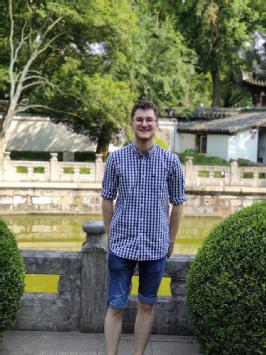
Email: andrew.nugent@ucl.ac.uk
Office: D2.05 Zeeman Building
